Govt puts up White Paper on Elected Presidency scheme
SINGAPORE — Proposed changes to the Elected Presidency (EP) gathered pace on Thursday (Sept 15), after the Government released a 49-page White Paper on the recommendations by a commission tasked to review specific aspects of the scheme.
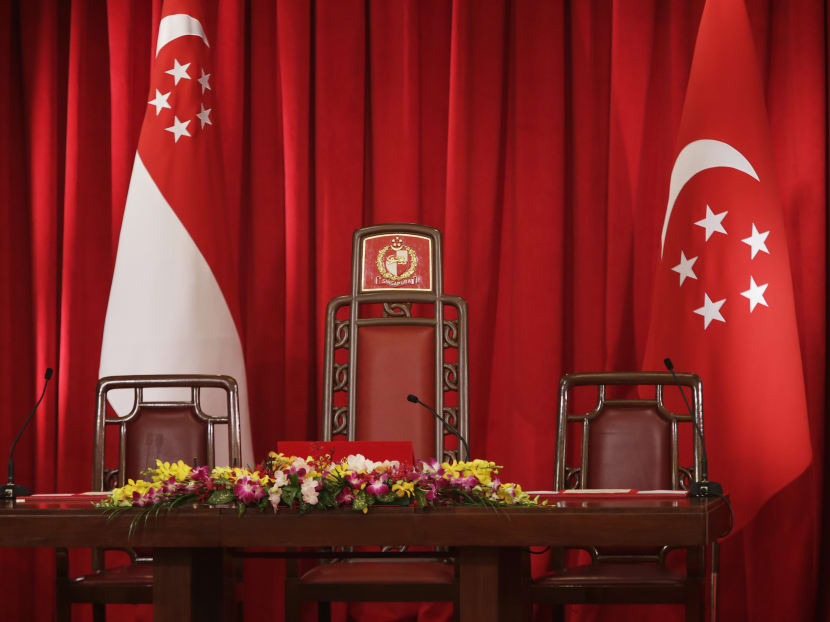
The Presidential Chair flanked by the State Flag and the Presidential Flag is seen at the Istana. TODAY file photo
SINGAPORE — Proposed changes to the Elected Presidency (EP) gathered pace on Thursday (Sept 15), after the Government released a 49-page White Paper on the recommendations by a commission tasked to review specific aspects of the scheme.
The Government has broadly accepted the recommendations — which were released last week — but it disagreed on some of the nuts and bolts, such as the minimum tenure in qualifying office for public-sector candidates, the threshold for Parliamentary override on President’s decisions and when the President’s opinion should be published in the event that he exercises his veto.
The Government also detailed its reasons for rejecting a return to the previous system of having Parliament appoint the Head of State — a recommendation which was beyond the commission’s terms of reference. Among other reasons, it reiterated that a President who is elected, with direct mandate from Singaporeans, would ensure that the office has the moral authority and mandate to disagree with an elected Government. The EP scheme remains the “most workable and effective solution” for Singapore at this moment, the Government said.
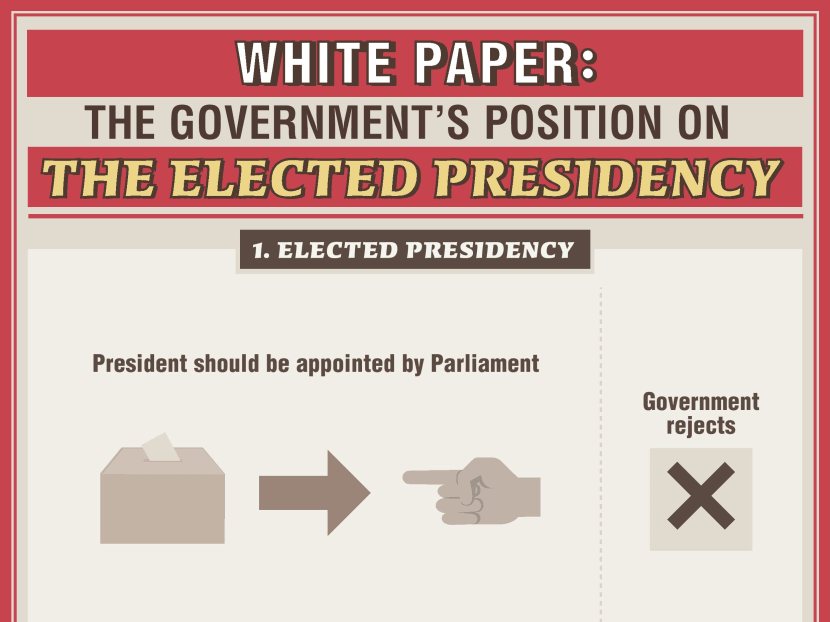
The amendments to the scheme will be introduced at the Parliament sitting next month and Members of Parliament will debate on the White Paper in November.
The nine-member Constitutional Commission, headed by Chief Justice Sundaresh Menon, was tasked with studying the eligibility criteria for prospective candidates for the Presidential Election, safeguarding minority representation in the presidency, and the framework governing the exercise of the President’s powers. The commission’s report was submitted last month, after six months of deliberations involving public hearings and written submissions from the public.
Among other proposals, the Government has accepted the recommendation to raise the bar for candidates to keep up with the times: Prospective private sector candidates would have to have helmed companies with S$500 million in shareholders’ equity, up from S$100 million in paid-up capital.
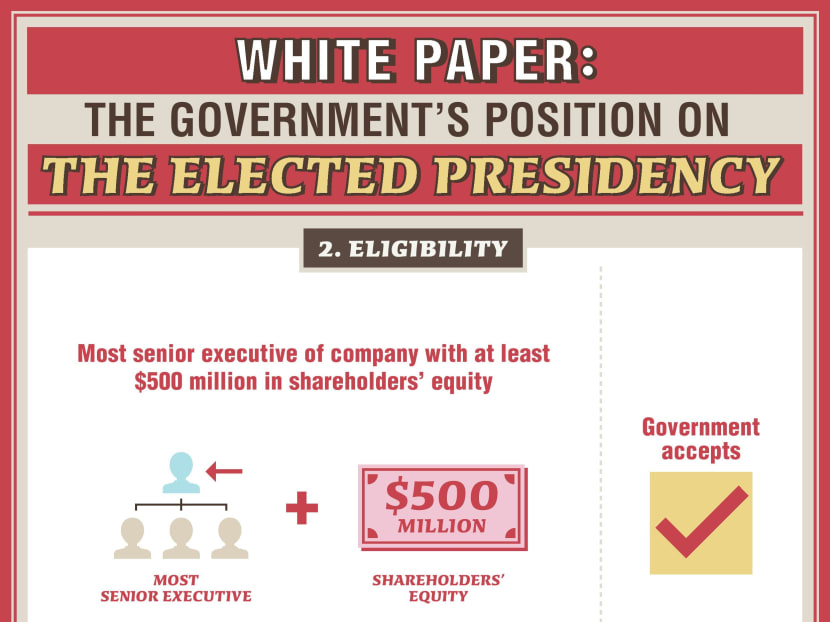
However, the Government will be taking a more cautious approach when it comes to minimum tenure for qualifying offices. While the commission had proposed that the requirement be doubled to at least six years, the Government is retaining the existing minimum tenure of three years.
While the Government agreed with the commission on the need for a currency requirement - which specifies the period where the tenures have to fall wholly or partly within - it said that it would proceed cautiously on this by setting the period at 20 years of a Presidential Election, instead of 15 years as recommended.
For public sector qualifying offices, the Government has opted to retain the offices of Accountant-General and Auditor-General on the list, despite the commission’s suggestion to remove these because they play “ancillary and comparatively narrower roles” compared to other qualifying offices. The Government said would like to consider this recommendation “more carefully” and would retain the status quo for now.
To safeguard minority representation, the Government will adopt the “hiatus triggered” mechanism recommended by the commission where presidential elections will be reserved for a particular race which has not been represented in the office for five consecutive terms. “It strikes an appropriate balance between maintaining the ultimate long-term goal of multi-racialism, and ensuring the representation of minority races in the Presidential office as we progress towards that ideal,” said the Government.
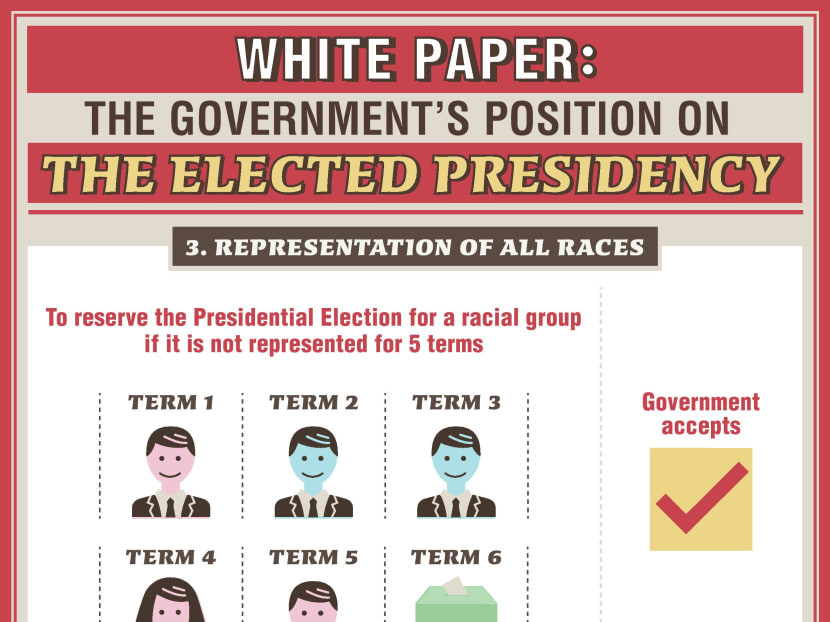
The Government also agreed with the commission that the President should consult the Council of Presidential Advisers (CPA) on all fiscal matters and key public sector appointments, and any disagreement between the President and his advisers will have to be brought before Parliament. But it disagreed with the proposal to calibrate the threshold for Parliamentary override according to the level of support among the council for the President’s decision. Doing so could unintentionally politicise voting patterns within the CPA instead of emphasising “the collective judgement of the council as a whole”, the Government said.
Beyond its terms of reference, the commission called for stricter rules on presidential election campaigns, citing instances of candidates overpromising beyond the powers of the President in the 2011 polls. They proposed, among other things, a clampdown on acts which could divide people or flame emotions. The Government said it would study this carefully and decide on the necessary changes to the rules governing campaign methods and preventing misinformation “in due course”.
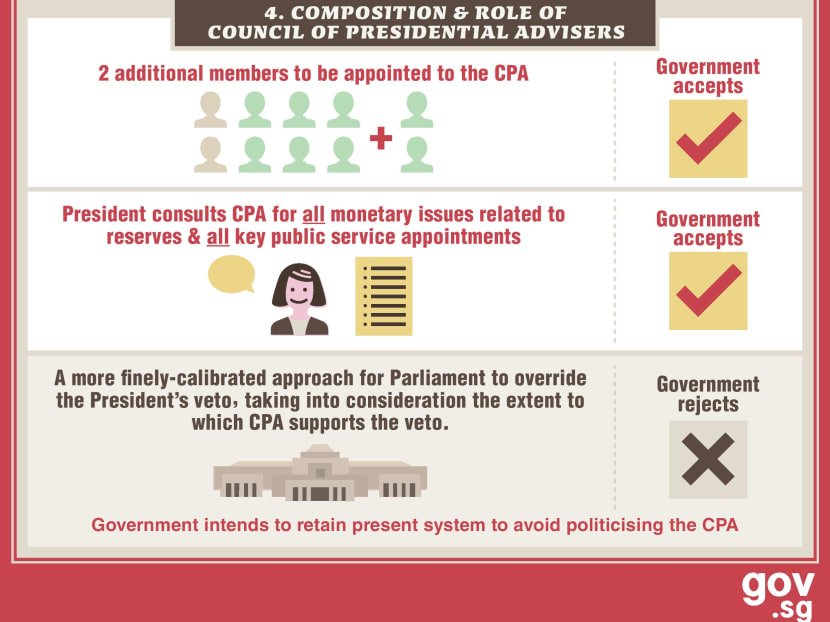
Speaking at a dialogue yesterday organised by the South East Community Development Council - which was attended by some 400 grassroots leaders and residents – Law Minister K Shanmugam addressed questions on the White Paper from the participants, such as on the shorter qualifying tenure proposed by the Government, and whether the changes went against the concept of meritocracy and would slow down decision-making processes.
In response, Mr Shanmugam pointed out that all candidates, regardless of race, will have to possess certain qualifications before they can run for President. Replying to a question on whether the changes were meant to prevent certain individuals from contesting in the next presidential election, which must be held by August next year, Mr Shanmugam reiterated that Singaporeans need to ask themselves if the changes being made are valid and in the interests of Singapore. The vast majority of the participants agreed with him that the President should hold custodial powers and be elected, and successful candidates should meet some criteria and these should be reviewed regularly. “Do we as a Government do what is right, based on the system, or do we worry (that) some people are going to say this is to knock out people we don’t like?” he said.






